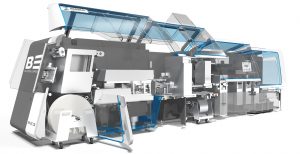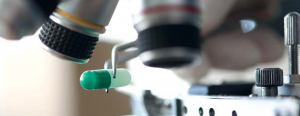In the pharmaceutical production process, granulation is playing an increasingly important role as a central process step. High-quality granules with highly precisely defined properties form the basis for tablets of outstanding quality. In addition, disintegration time and the subsequent resolution profile can be formulated more and more individually by the granule. This enables a new dimension in dosing. Continuous development of the technology has meant that greater precision and safety can now be guaranteed throughout the entire pharmaceutical production process. In principle, the wet and dry granulation techniques have hardly changed. However, they have benefited greatly from scientific advances in sensor technology, analytical methods and control. Pharmaceutical manufacturing is clearly developing in the direction of "Smart Pharma".
Wet granulation - used in more than 85 percent of the production processes
Wet granulation remains the most important and most widely used process, although it is complex, time-consuming, labor-intensive and resource-intensive. It also requires multiple machines and process steps. Nevertheless, this process is used in more than 85 percent of the world's granulation applications in the industry. Reasons include:
- better (controllable) rates of resolution, which achieve release of less soluble drugs
- high uniformity of tablet contents
- higher average particle size of the formulations
- improved flow properties of the powder
- improved compressibility during tableting
Wet granulation techniques have evolved in parallel with technological advances, offering new variations. For example, new types of binders can be used and the methods for their incorporation expanded. Of course, conventional wet granulation techniques are strongly focused on and widely used by today's pharmaceutical industry. However, the pharmaceutical industry is increasingly facing new challenges in terms of strict regulatory requirements. In addition, it is a question of competitiveness in terms of price and speed, on the market.
Compact, Integrated Granulation Systems – the Optimal Solution
Innovations and consistent compliance with regulatory requirements are changing pharmaceutical production significantly and faster than ever before. At the same time, politicians worldwide are demanding that drugs can be made available to the population in large quantities. At the same time, regulatory authorities such as the FDA are rightly insisting on higher quality standards. These fundamentally positive developments have forced pharmaceutical manufacturers to question conventional manufacturing processes and develop them further with new approaches. A conventional granulation setup is flexible up to a point. However, by design, it involves several independent and multi-stage production steps. This results in various challenges for production equipment and material handling:
- significant demand for production space (room width and height) and technical space
- typical lack of containment
- high labor intensity and multiple operators are required
- longer processing times
- lower yield due to losses at material transfer points
- higher product contamination risk
- hazards for operating personnel
- increased effort to comply with GMP
- high costs and time required for cleaning and validation of each machine
Due to these conditions, there is an urgent need for innovative manufacturing concepts that can produce pharmaceuticals in exceptional quality, within a shorter time and at a lower overall cost. Developments at L. B. Bohle have shown that integrated or compact granulation systems are better suited to meet these requirements and to respond flexibly to different requirement profiles.
Batch wet granulation using a combined granulation line consisting of a high-shear granulator GMA and fluid bed dryer BFS is the optimal technology for the production of solids in the pharmaceutical industry. The integrated granulation plant combines high-shear granulation and fluid bed drying, as well as sieving, in one system. This minimizes individual process steps and interruptions. The integration of the process equipment does not change the basic principle of the wet granulation process. However, the efficiency of the entire process is increased. At the same time, challenges associated with complexity are reduced.
An overview of the advantages of integrated granulation:
- Reduced space requirement(s) for GMP rooms
- faster production cycles
- closed product handling, improved industrial hygiene
- higher safety standards for equipment, personnel, premises, and environment
- common control platform and system integration
- improved GMP compliance
- Reduced space requirements and building costs
Conventional granulation systems consist of several stand-alone components that occupy a considerable amount of production space, sometimes on several floors. In contrast, an integrated granulation system not only reduces the overall footprint of the process machine, but also reduces downtime due to shorter cleaning and changeover times between production batches or when product changes. In addition, energy requirements for heating, ventilation and air conditioning are significantly reduced.
- Closed product handling, improved occupational hygiene
With non-integrated granulation systems, materials must be transported between individual machines several times during the process. This starts with the powder feed in the high-shear granulator and continues with the transfer of the wet granules to the wet mill, through drying in the fluidized-bed dryer to the dry mill and finally to the container or mixer.
During these transfer processes between individual machines, there is a risk of product meeting environmental air and operators. Thus, when loading dry powders into the granulator and transferring dried granules into the dry mill and mixer, potentially toxic substances or dust hazardous to health could be released. One advantage of integrated granulation is therefore that the release of product dust and vapors is contained during transfer. This additional safety is particularly crucial in processes involving organic solutions and moisture-sensitive products. At the same time, a closed production method prevents potential product contamination and increases safety for operating personnel.
Loading and unloading materials during granulation typically involves significant manual labor and risk. An integrated granulation system simplifies the process in several ways. During material loading and unloading, the high-shear granulator remains closed. This means that the operator is not exposed to toxic dusts and fumes.
- Higher safety standards for equipment, personnel, and premises
An integrated granulation system usually means a high investment for pharmaceutical companies. An important aspect in the new acquisition and the selection of the supplier is to increase the safety standards. Therefore, L.B. Bohle produces granulation systems that guarantee the highest safety standards as well as efficiency and effectiveness while requiring a small footprint.

- Common control platform and system integration
An integrated granulation system has one control unit for both machines. This central control unit replaces common systems in which each individual unit has its own control. In fact, if the production line previously often consisted of individual machines from different manufacturers, the interface problem often led to data chaos or considerably more work. A central control unit ensures that the transfer of product between the stages of the granulation process takes place in a closed system. In addition, batch data can be automatically uploaded for faster overview and analysis.
- Improved GMP compliance
Integrated granulation systems meet GMP guidelines easier and better than conventional granulation systems, thanks to minimal manual intervention and reduced product exposure.
Production becomes "smart
Granulation is the critical first step in producing robust solid dosage forms of pharmaceutical products. It sets the foundation for high-quality tablets and capsules. In addition, the process also defines their release properties and subsequent therapeutic potency. Overall, however, granulation represents a task with growing demands and is a labor-intensive production process. To overcome these challenges, an integrated granulation system represents the optimal solution, as it allows efficiency, safety, and performance to be increased. Integrated granulation thus offers immense advantages and embodies a modern and compact production system with innovative technology. It supports compliance with current regulations, optimizes operations, and reduces costs and risks. In addition, the system opens competitive advantages for the pharmaceutical manufacturer. And if this technology is consistently used and further developed, it will open further application possibilities on the way to "Smart Pharma".
L.B. Bohle Maschinen + Verfahren GmbH
Tobias Borgers, marketing
tel.: +49 (0) 2524-9323-150
fax: +49 (0) 2524-9323-399



